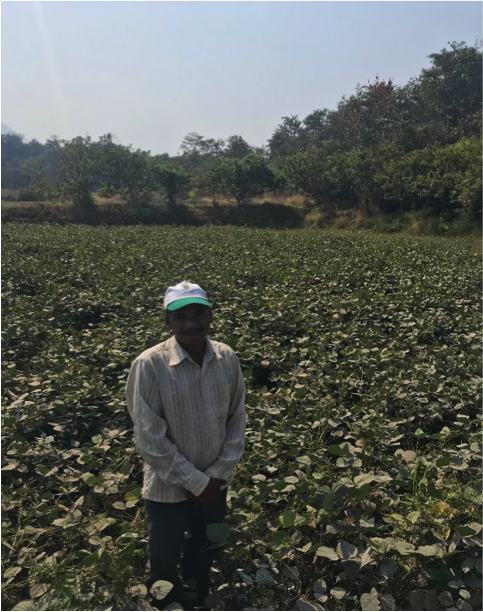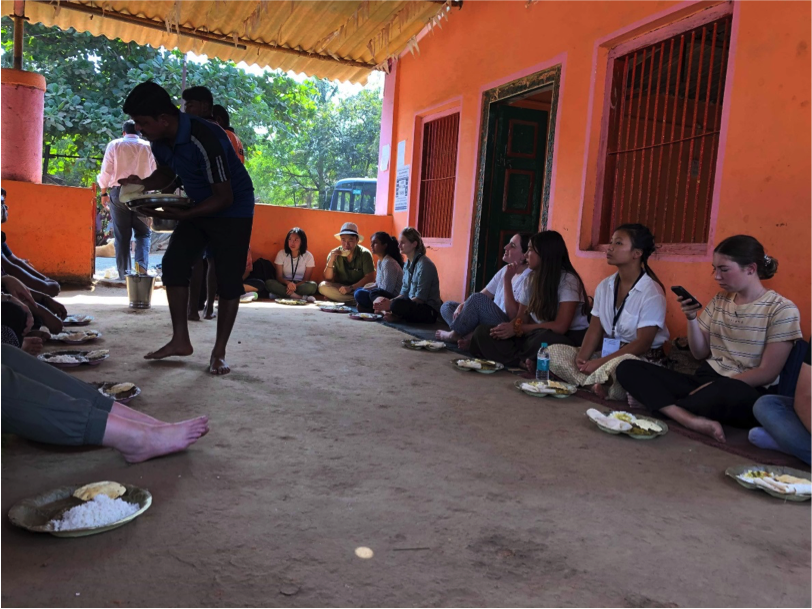Alice Murnaghan
Exchange student form Trinity College Dublin, studying political science and geography
There was a bumpy start to the day as we rode our bus out of smoggy Mumbai and headed along the precarious roads East to the rural village of Mograj. Once we arrived we immediately checked out the seemingly newly built toilet facility next to the crop fields which was clean and functional. The farmer whose land we were on kindly welcomed us with sweet tea and biscuits (a common occurrence in India) and expressed to us that he felt overwhelmed that we had travelled so far to come to his small-scale farm. It seemed that many of us also felt overwhelmed by the sheer beauty and peacefulness of the area considering that it was only a short drive out of bustling Mumbai. He explained to us the importance of NGOs in the agricultural work that he and his village does – they provide training for farmers in organic farming practices so that they can train others (like he is now able to do), research ways in which crops can be processed to reach the market effectively, and help farmers even after their farm is running effectively to capitalise on the economic and social status of their villages.

We were then taken on a walking tour through the crops that he was currently cultivating. It was here that we learnt about how the organic farming methods worked in practice and how they benefitted him over time. In his field he had a variety of crops growing at the same time (17 to be exact) – including okra, aubergine, dhal and peas. From what I observed I could see that he allowed some weeds to grow amongst his crops, which improve the stability and nutrients balance in the soil as well as providing increased biodiversity. Coupled with the fact that no artificial pesticides or fertilisers are used on the crops generates improved resilience to external shocks such as drought. We learnt that resilience to drought was particularly important for this region considering that it struggles with water scarcity after March, being surrounded by hills that have water storage facilities that they are yet able to access (but are researching ways to do so with the help of the NGOs). In addition, the organic farming method requires far less manual labour and he now only needs to employ three to four people as opposed to the 15 or more he used to employ on his traditional farm. The low energy exertion required means that the job is suited to a wide variety of people – young, old and of any gender. This could improve women’s access to suitable employment and also allows this farmer in particular to spend his extra time educating others and becoming involved in the leadership of his community.

From my previous study on organic farming, I knew that often it was the case that modern hybrid varieties often produced higher yields in the short term, but also required higher costs and were highly dependent on specific weather and soil conditions (needing agrochemical inputs to bolster soil productivity). In contrast, organic farming may produce higher yields in the long term because of its resilience to diverse weather and soil conditions. I asked whether the implementation of organic techniques had helped increase the harvest, and the simple answer was “yes”, and also, it produced many other indirect economic and social benefits for the village as a whole with the aid of NGOs. These may include increased education and awareness of sustainable and effective agriculture techniques, leading to heightened food and water security which would benefit health and wellbeing and therefore living standards. Furthermore, these practices and the education surrounding them will help to offset the negative impacts of climate change on farming for generations to come.
We were treated to a delicious traditional lunch served on the floor of one of the communal buildings in the village and then sweated it off with a walk through the forest to another small-scale organic farmer. Once we’d had our fill of sweet tea we boarded the bus again to return to the city of Mumbai, which now felt like another world entirely.


Very nice
खुप छान मस्त .
Me and my team from Saguna Rural Foundation are from the same vicinity of the village Mograj and the farmer Mr Parshuram. Our team & our No Till farming technique SRT (www.srt-zerotill.com) is responsible for the sustainable upliftment of Parshuram & many other farmers. SRT can not be called as organic but it is a regenerative technique that makes farmer, land & the environment happy. Technically ‘Organic’ is rather a marketing technique than a agronomic practice. Apparently the English translator has imposed his vision about ‘Organic’ (positive but big wrong) farming. You & the world must understand the truth about ‘Organic’, I mean ‘must go from flat earth theory to round earth theory’; hence the comment.